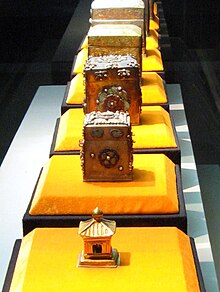Chinese boxes

Chinese boxes (Chinese: 套盒; pinyin: tàohé) are a set of boxes of graduated size, each fitting inside the next larger box.
A traditional style in Chinese design, nested boxes have proved a popular packaging option in the West for novelty or display reasons.
Chinese nested boxes have inspired similar forms of packaging around the world, but also have found use as a figurative description, providing an illustrative example to demonstrate situations of conceptually nested or recursive arrangements.
In literature, a Chinese box structure refers to a frame narrative,[1] where a novel or drama is told in the form of a narrative inside a narrative (and so on), giving views from different perspectives. Examples include Plato's dialogue Symposium, Mary Shelley's 1818 novel Frankenstein, Jostein Gaarder's The Solitaire Mystery, Emily Brontë's Wuthering Heights,[2] and Joseph Conrad's Heart of Darkness.
See also
References
- ^ Zhang, Benzi (1993). "Paradox of Chinese Boxes: Textual Heterarchy in Postmodern Fiction". The Canadian Review of Comparative Literature / Revue Canadienne de Littérature Comparée. 20 (1 and 2): 89–103 – via University of Alberta Library.
- ^ Sakuma, Chihiro. "Narrative Structures and Spaces in the English Romantic Novel: An Intertextual Study of Mary Shelley, Charles Maturin and the Bronts".
{{cite journal}}: Cite journal requires|journal=(help)
External links
